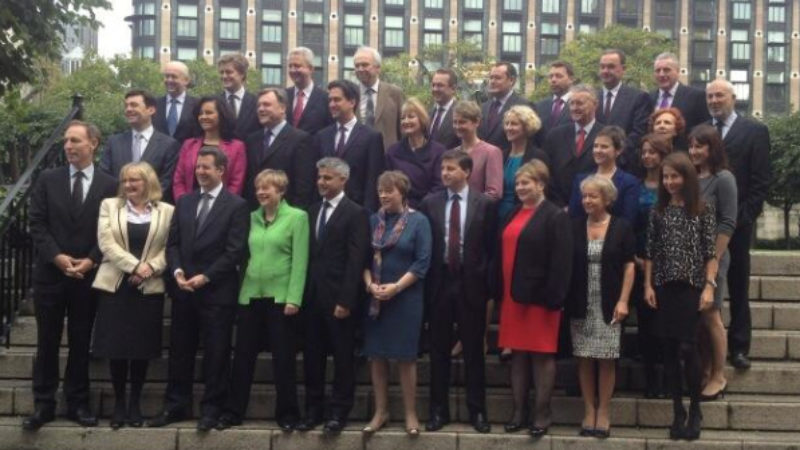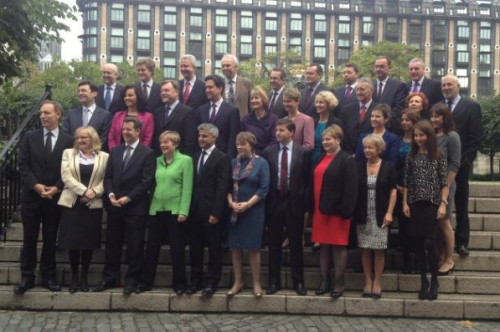
- Get on a doorstep
- Get under the skin of the British public
- Get on the shop floor
- Get inside the head of a business owner
- Get to grips with Whitehall…
- … and the people who work there
- Get serious about the state
- Get intimate with the global system and…
- … get a view on how we’re going to fix it
- Get on a plane
I have felt like a fish out of water many times in my political life, but perhaps never more so than finding myself the only person in a circle with ‘the punters’ written on a post-it note. A political colleague had asked us to identify the group of people we worried most about keeping happy. Apparently the right answer is the Parliamentary Labour Party. It might have been in SW1, it certainly wasn’t in the marginal council ward I left my desk for of an evening.
LabourList has got itself in trouble before by asking how often senior Labour figures are speaking to the public rather than about us. And we’re not helped by the skewed geography of power in Britain. But we’re surely missing a trick when those with the tightest grip on Labour’s strategy are either unelected peers or MPs drawn from Labour’s safer seats. How about we add a few street fighters from the super marginals in to the mix and set a public expectation that everybody involved in setting Labour’s course for government – from the wonks to the spinners to all those on our front benches – should spend at least a portion of their week looking actual voters in the eye? We don’t need to remove anybody from Labour’s top table, but hard-wiring in a little diversity and doorstep feedback would make a strong team even stronger.

Even if the wet and wind don’t make endearing company, there are still plenty of other ways for the cabinet in waiting to get under the skin of the country they hope to lead. Julian Baggini’s Welcome to Everytown should be compulsory reading for everybody, like its author, who “prefers arthouse films and red wine to telly and tea”. Meanwhile PPCs like Rowenna Davis are showing that getting on the shop floor doesn’t need to mean cutting ribbons and posing for pictures: check out her ambulance shift on the frontline of the NHS.
While experiencing life in our public sector undoubtedly makes our candidates better, we also need to do more to correct for the fact that more Conservative than Labour MPs have a private sector background. Labour actually has enterprise ideas coming out of our ears: what we need now is for every single MP and PPC to not just know the lines but to see those changes through the eyes of an entrepreneur. Five hours reading this is worth its weight in CBI reports.
While they are ploughing through their recess reading, two more things are worth adding to the pile. How to be a Minister is more than 30 years old, but it hasn’t been bested as a frank insider’s account. And How to be a Civil Servant will help them understand the fiendishly clever but avowedly apolitical people who will suddenly shape their days if we win next May.
The end of New Labour’s time in office has seen all sorts of people unburdening themselves in publications ranging from the specialist to the scandalous. But what rings out across that spectrum is a howl of ministerial despair about just how many obstacles stand in the way of actually getting anything done. Some of that is self-justificatory tosh, but some reflects a reality coalition ministers seemed completely unprepared for: running a country is really, really hard. The earlier our shadow teams and their advisors internalise that, the more likely we are to avoid the coalition’s fate of having lots of our senior people deserting their posts in the first few years of government.
At the same time as getting to grips with departmental life, our people need to get serious about the state. Alison McGovern’s short pamphlet wrestles with the biggest public services question facing the next Labour government: what would a state look like that valued people’s relationships with each other more than their relationship with it?
Many of these suggestions can be done by MPs in their constituencies, or on the journeys between them and parliament. The final three will take a bit more effort of imagination and of planning.
The first is to get intimate with the global entanglements which will determine many of the options available to us in office. The IPPR and the Fabians have both brought out recent publications sketching out the foreign policy landscape facing Labour. They are very different but both indispensible. But after immersing themselves in international affairs, shadow cabinet members will still need to take a view on how we resolve the nightmarish dilemmas our global inter-dependence throws up. This is not a job for Douglas Alexander, Vernon Coaker and Jim Murphy alone: our whole future government needs to show we can pass the ‘finger on the button test’ which voters still apply to those wanting to run one of the biggest economies and militaries on earth.
That’s why the final thing our top team needs to do is actually pretty simple. Ed Miliband has just cancelled his trip to India, the first big foreign intervention he was due to make. He needs to reschedule it quickly and mandate his colleagues to undertake some serious foreign tours over the summer. It’s time for them to get out there and see the world we’re trying to change. That’s the only way to understand just how much what happens beyond our borders is already changing what happens inside them each and every day.
Kirsty McNeill is a former Downing Street adviser and a strategy consultant for campaigning organisations. She tweets @kirstyjmcneill.




More from LabourList
‘Labour won’t stop the far right by changing leaders — only by proving what the left can deliver’
‘Cutting Welsh university funding would be economic vandalism, not reform’
Sadiq Khan signals he will stand for a fourth term as London Mayor